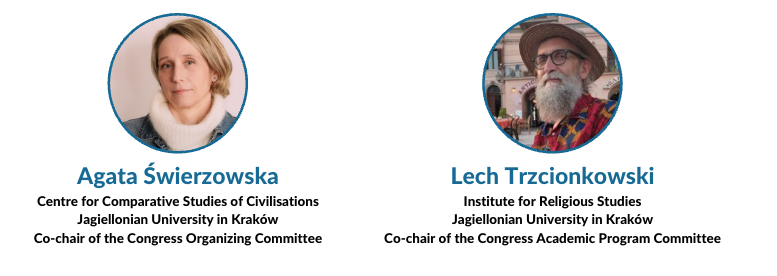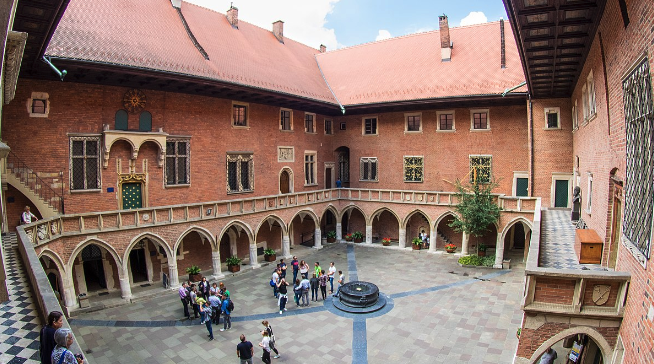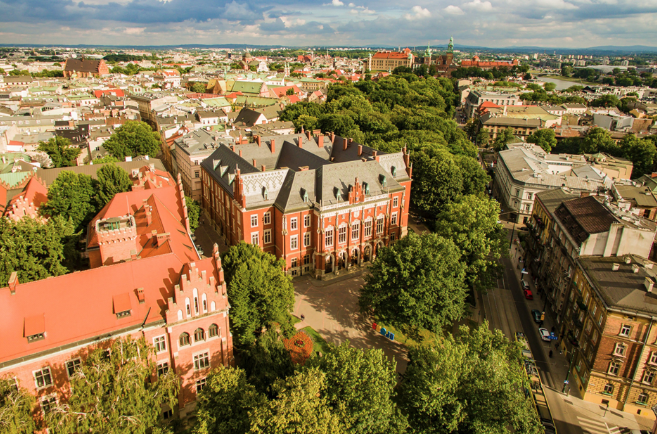To provide AAR members with insights into the upcoming World Congress, the IAHR Publications Officer interviewed Agata Świerzowska and Lech Trzcionkowski of Jagiellonian University.

Agata co-chairs the Congress Organizing Committee, and Lech co-chairs the Congress Academic Program Committee. Although the AAR became a member of the IAHR relatively recently, in 2010, its World Congresses have consistently attracted many scholars from the USA and Canada. In fact, attendees from these two countries have comprised the second-largest group, after the host country, at the past three Congresses. We look forward to welcoming many AAR members to the historic city of Kraków.
This interview is followed by Call for Papers.
What inspired Polish scholars of religion to submit a bid for the 2025 World Congress?
AŚ: As we stated in the bid, there were several reasons we offered to organize the Congress in Kraków in 2025. We saw the fun of having Kraków host in the year 2025 that marks the anniversaries of several important events in the history of religious studies: the 125th anniversary of the first World Congress of religious studies held in Paris in 1900; the 75th anniversary of the founding of the IAHR in Amsterdam and – particularly important for us – the 25th anniversary of the founding of the European Association for the Study of Religions in Kraków in 2000.
Our scientific theme "Out of Europe" highlights a particular historical moment in the development of the discipline. Looking back at the development and achievements of the science of religion initiated in Western Europe, we see its global dimension and wish to contribute to discussions regarding the future.
Such an event without a doubt provides participants with an opportunity for interaction and exchange of ideas. Our ambition is to bring together scholars’ perspectives and methodologies to encourage critical approaches and new openings in the discipline. We would like to encourage interdisciplinary dialogue and critical approaches to religious phenomena across disciplinary boundaries. We also thought that holding the IAHR Congress in Poland, in Kraków, would help to activate and open wider avenues of cooperation for scholars of religious studies from Central and Eastern Europe.

Collegium Maius, Jagiellonian University | Credit: Robert Rachwał
The theme of the upcoming World Congress is "Out of Europe: Studying Religion(s) in Interconnected Worlds." Could say a few words about how you developed this theme?
AŚ, LT: We worked together – researchers from the Institute of Religious Studies and the Centre for Comparative Studies of Civilization at the Jagiellonian University in Kraków, as well as representatives of the Polish Society for the Study of Religions. We have assumed that concept of “religion” and the scientific approach to studying it were both conceived in Europe and exported out of Europe. The process of exploring “otherness” enabled a formation of European identity. That was our starting point in thinking about the theme of the Congress.
In the discussions held within the team preparing the bid, we essentially wanted to go beyond, or at least show the paths leading beyond this space. At the same time, we were aware that today's world is a global village in which everyone is the Other. Therefore, we were asking the question: how did these processes of identity formation influence what has been perceived as a “proper” way of global understanding and of studying religion?
“Others” have been identified by a long tradition of thinkers and scholars that itself opened a way to orientalism, colonization, decolonization, and a post-colonial situation, academic and otherwise, that is still evolving in various ways. However, Europe itself has also always been the “Other." How were indigenous religious concepts translated into European studies? How have the encounters between Europeans and non-Europeans have been reciprocally transforming their participants? And how did both this presence and the discipline transform indigenous religious concepts in return?
AŚ: In our discussions, many doubts were expressed, especially since our team included people involved in various cultural areas, as well as those studying what happens at their intersections. We did not provide ourselves with answers to the questions posed, but we thought that the IAHR Congress would be an excellent place to ask them and to seek answers. This is how the main theme, along with the sub-themes, was developed, which later in the process took the form of five thematic streams.
LT: When the Congress was awarded to Kraków, the discussion continued in the Academic Program Committee. We decided to add the subtitle “Studying Religion(s) in Interconnected Worlds.” I think it best captures the Congress's idea. You can read about the details on the Congress website.

Collegium Novum, Jagiellonian University | Credit: Swifteye
The IAHR and you as the Congress hosts welcome all study of religions scholars from around the world to Kraków. What is particular about the 2025 Congress venue?
AŚ: Kraków itself is a special, magical place... I don't know if you are aware, but on the Wawel Hill, the former seat of Polish kings and queens (Kraków was the capital of Poland almost until the end of the 16th century), there is a Chakra which is believed to emanate powerful spiritual energy; it is said to be one of the most potent places of this type in the world. That in itself is probably a good reason to visit Kraków... but to speak seriously and briefly, because one could talk about Kraków for a very long time, Kraków has one of the best-preserved medieval city centers in Europe. It's rich in cultural attractions and its extensive museum holdings were showcased when it was designated as a European City of Culture for the year 2000. The city’s cultural heritage is mirrored in its intellectual achievements – Jagiellonian University, the oldest Polish university (founded in 1364) is one of the oldest European universities. Astronomer Nicolaus Copernicus and anthropologist Bronisław Malinowski were among the most prominent students at this university.
LT: Kraków exemplifies a city where religion significantly shapes urban ecologies. The city is the historical capital of Poland and has been influential in shaping local cultural and religious heritage. The hegemonic position of the Roman Catholic Church is evident, as Kraków is frequently referred to as the “Papal City” due to its association with Pope John Paul II. Additionally, the city is an important center for religious tourism. The interplay between local and global dimensions of religion has transformed Kraków into one of the nodes in transnational religious landscapes. Recently, we have seen increasing religious expressions associated with new migrants and emerging ethnic/national diasporas. The influx of new residents and tourists has increased the visibility of Orthodox Christianity, Greek Catholicism, Hinduism, Islam, various Protestant denominations, and Neo-Pagan groups.
Beyond the pervasive Roman Catholic context, Kraków holds a rich Jewish heritage. The Kazimierz district, historically a Jewish part of the city, is home to several synagogues and religious institutions. In the 20th century, Jewish Kraków shared the fate of communities living in the “Bloodlands,” where the Shoah and totalitarian regimes disrupted earlier inclusive traditions. The German Nazi extermination camp Auschwitz lies 40 miles from Kraków.
The preparations for the academic program of the Congress are in full swing. Could you give us some little insights in what we can expect in August 2025?
AŚ: We won't say too much so as not to spoil the surprises... At the moment, we have several dozen incredibly interesting thematic panels registered. We are planning a film panel, which is a novelty as such an option has not been available at IAHR Congresses before. There will be a photography exhibition combined with conference presentations. We also plan to organize tours to acquaint participants with the cultural and religious richness of Kraków and its surroundings, offering a chance to experience the traditions and customs of the Małopolska region firsthand. We are convinced that, in addition to intellectual experiences, everyone will find many other interesting things for themselves. All information is continuously updated on the congress website.
Call for Papers